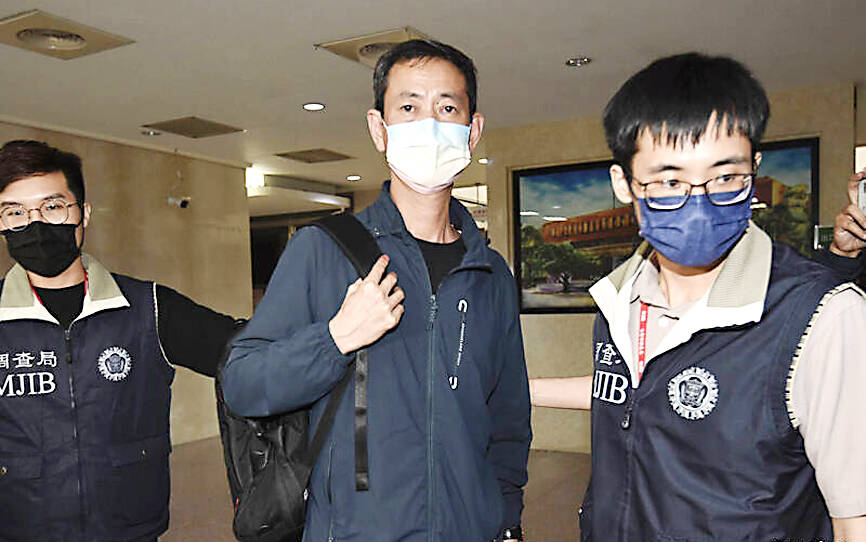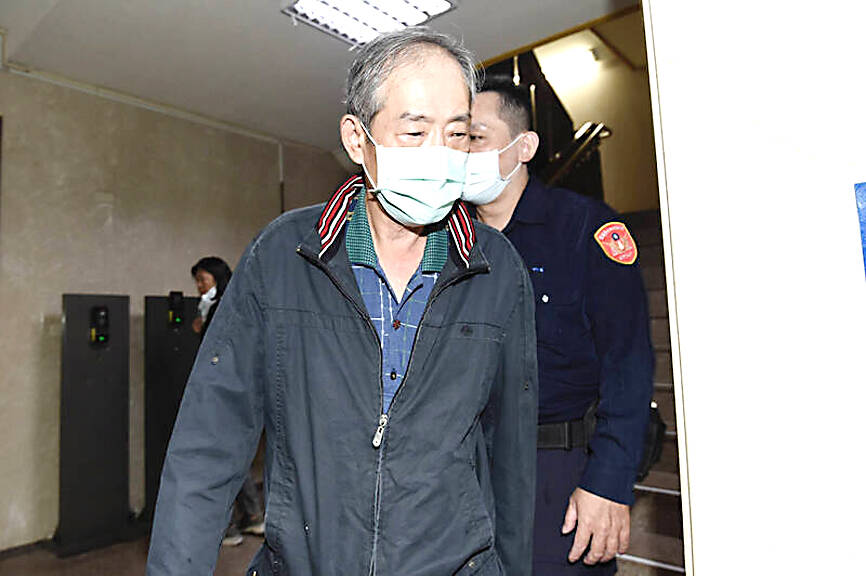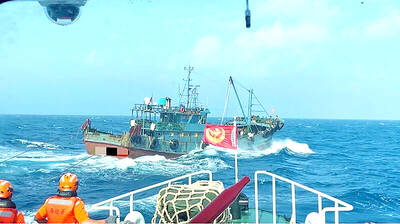Three people connected with China-funded organizations, including Chou Ke-chi (周克琦) who heads the Gong He Party (共和黨), were indicted yesterday for contravening the Anti-Infiltration Act (反滲透法).
Along with Chou, who also heads the pro-China agitation group 333 Political Alliance (333政黨聯盟), Pan Jindong (潘進東) and Chu Chun-yuan (朱俊源), board members of the Taipei Puxian Association (莆仙同鄉會), were also indicted. Puxian is another name for Putian, a city in China’s Fujian Province.
The three are the first people Taipei prosecutors have charged for contravening the Anti-Infiltration Act since it was passed by the legislature in 2020 to counter the influence of foreign hostile forces seeking to meddle in Taiwan’s elections.

Photo: Tsung Chang-chin, Taipei Times
Prosecutors said that an investigation found that Chou had received money from China to pay for him to organize activities against Taiwanese independence groups, denounce efforts to improve Taiwan-US relations and carry out targeted protests against the US National Endowment for Democracy during the World Movement for Democracy’s Global Assembly in Taipei in October last year.
Money from China also allegedly helped to fund the Gong He Party’s candidates for Taipei mayor and city councilor offices in the nine-in-one elections in November last year, prosecutors said.
Pan and Chu allegedly made frequent trips to China, including Putian, to channel money to Chou, prosecutors said.

Photo: Tsung Chang-chin, Taipei Times
The indictment said that Pan was born in China’s Fujian Province and immigrated to Taiwan in 2002 with family, later becoming a Taiwanese citizen.
In China, government officials allegedly invited Pan to serve as deputy director of the Putian Porcelain Arts Museum, which is funded and controlled by the city’s Taiwan Affairs Office, prosecutors said.
The office focuses on “united front” activities targeting Taiwanese businesspeople and students, and also allegedly provides money to conduct pro-China propaganda campaigns in Taiwan, they said.
Pan and Chu allegedly were charged with carrying out “united front” activities and fielding pro-China candidates for elected office, they said.
The pair allegedly provided Chou with NT$220,000 last year, which contravenes laws on registered political parties receiving funds from foreign sources, prosecutors said.
Chou allegedly used the money to make flags and print pamphlets for the Gong He Party, as well as to organize rallies to espouse Chinese political propaganda, they said.
He also allegedly used the money for campaigning for the party’s Taipei mayoral candidate, Tang hsin-min (唐新民), and those running for city councilor seats, they said.
Tang received 316 votes, or 0.02 percent, in the election, while the party’s councilor candidates received a combined 67 votes, data from the Central Election Commission showed.
Chou and Pan allegedly organized a protest outside the World Movement for Democracy’s Global Assembly last year, paying 65 people NT$200 to NT$250 to attend the demonstration, along with other expenses, prosecutors said.
Chou, Pan and Chu also allegedly collaborated to record and compile videos and briefs on their campaigns and protest activities, sending them to their Chinese handlers through WeChat, they said.

The Ministry of the Interior (MOI) is to tighten rules for candidates running for public office, requiring them to declare that they do not hold a Chinese household registration or passport, and that they possess no other foreign citizenship. The requirement was set out in a draft amendment to the Enforcement Rules of the Public Officials Election and Recall Act (公職人員選舉罷免法 ) released by the ministry on Thursday. Under the proposal, candidates would need to make the declaration when submitting their registration forms, which would be published in the official election bulletin. The move follows the removal of several elected officials who were

The Republic of China (ROC) is celebrating its 114th Double Ten National Day today, featuring military parades and a variety of performances and speeches in front of the Presidential Office in Taipei. The Taiwan Taiko Association opened the celebrations with a 100-drummer performance, including young percussionists. As per tradition, an air force Mirage 2000 fighter jet flew over the Presidential Office as a part of the performance. The Honor Guards of the ROC and its marching band also heralded in a military parade. Students from Taichung's Shin Min High School then followed with a colorful performance using floral imagery to represent Taiwan's alternate name

COGNITIVE WARFARE: Chinese fishing boats transmitting fake identification signals are meant to test Taiwan’s responses to different kinds of perceived incursions, a report said Chinese vessels are transmitting fake signals in Taiwan’s waters as a form of cognitive warfare, testing Taipei’s responses to various types of incursions, a report by the Institute for the Study of War said on Friday. Several Chinese fishing vessels transmitted fake automatic identification system (AIS) signals in Taiwan’s waters last month, with one mimicking a Russian warship and another impersonating a Chinese law enforcement vessel, the report said. Citing data from Starboard Maritime Intelligence, the report said that throughout August and last month, the Chinese fishing boat Minshiyu 06718 (閩獅漁06718) sailed through the Taiwan Strait while intermittently transmitting its own AIS

CHINESE INFILTRATION: Medical logistics is a lifeline during wartime and the reported CCP links of a major logistics company present a national security threat, an expert said The government would bolster its security check system to prevent China from infiltrating the nation’s medical cold chain, a national security official said yesterday. The official, who wished to stay anonymous, made the remarks after the Chinese-language magazine Mirror Media (鏡周刊) reported that Pharma Logistics (嘉里醫藥物流) is in charge of the medical logistics of about half of the nation’s major hospitals, including National Taiwan University Hospital and Taipei Veterans General Hospital. The company’s parent, Kerry TJ Logistics Co (嘉里大榮物流), is associated with the National Committee of the Chinese People’s Political Consultative Conference (CPPCC) and the Chinese People’s Liberation Army (PLA), the